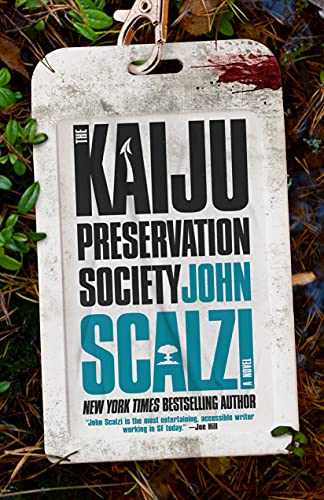![]() The Kaiju Preservation Society by John Scalzi
The Kaiju Preservation Society by John Scalzi
 In his Afterword, John Scalzi explains that his newest book, The Kaiju Preservation Society (2022), took the place of another he struggled to finish during these awful times we’ve lived through these past few years. This one, he says, is not “with absolutely no slight intended, a brooding symphony … [but] a pop song … light and catchy … for you to sing along with, and then you’re done, and you go on with your day.” And he’s mostly not wrong, though I might quibble a bit if I continue the metaphor, noting on the good side, for instance, that while it doesn’t brood, it does occasionally bite. And adding on the not-so-good side that one “sings along” because the pop song has lodged in one’s memory, and I’m pretty sure this book won’t do that.
In his Afterword, John Scalzi explains that his newest book, The Kaiju Preservation Society (2022), took the place of another he struggled to finish during these awful times we’ve lived through these past few years. This one, he says, is not “with absolutely no slight intended, a brooding symphony … [but] a pop song … light and catchy … for you to sing along with, and then you’re done, and you go on with your day.” And he’s mostly not wrong, though I might quibble a bit if I continue the metaphor, noting on the good side, for instance, that while it doesn’t brood, it does occasionally bite. And adding on the not-so-good side that one “sings along” because the pop song has lodged in one’s memory, and I’m pretty sure this book won’t do that.
I might therefore have gone more for the food rather than music metaphor. Something that goes down fast and easy, leaves a fleeting sweetness in the mouth then quickly disappears from mouth, hand, and mind. A handful of grapes or almonds maybe, with an occasionally too-soft or too-stale one. Or maybe, since the book felt a little overlong, a handful of M&Ms, because you always grab a few too many and wish you would have stopped five or seven earlier.
The Kaiju Preservation Society opens with our main character, Jamie Gray, unexpectedly and rudely demoted by their asshole boss from a marketing position to “deliverator” for a relatively new food delivery startup just at the beginning of the pandemic. Luckily, one of the people Jamie delivers to works at the KPS and just happens to desperately need a new employee. After a whirlwind interview, vaccination session, and flight to Greenland, Jamie arrives at a place inhabited by Godzilla-like creatures. We get the big reveal, some exciting scenes thanks to the work Jamie is involved in, then a villain gets introduced and the stakes get raised.
As noted, the book is fast-paced, moving along quickly and easily via lots of dialogue, much of it in the quippy and sarcastic vein or the “oh god oh god oh god we’re gonna die” vein. And often it’s both. Jamie’s a relatable, likable character, one that’s easy to root for thanks to the shafting they get early on and their self-deprecating (“I lift things”) sense of humor. The underlying ecology of the kaiju and their habitat, even if it’s a bit hand-wavy, is interesting, though it sometimes does come in big chunks. All of which are natural parts of the plot — an orientation session for the newbies, for instance — but still feel a little too on point. That on-the-nose issue raises its head as well with the satire, which is chuckle-worthy at times and a bit too obvious at other times.

I mentioned in the intro that I felt the book went on too long, but it’s not so much that it drags but that the latter part enters a new type of story, one that I felt was far less successful. The character interactions, the kaiju scenes, the learning on the job, the chase scenes, the “oh my god we’re gonna die” moments all worked well until the introduction of the villain, at which point the book went off the rails for me. The antagonist(s) felt both incompetent and cardboardy, the story became ever more implausible (yes, Godzilla-like monsters, I know; still), and I never bought the higher stakes. It almost felt like Scalzi didn’t trust his own original creation and felt the need to bring in a host of standard tropes to keep the reader engaged. Unfortunately, it had exactly the opposite effect for me.
That said, The Kaiju Preservation Society is a fun, light read for the first two-thirds or so of its length and if the latter part doesn’t maintain even that level (say, a solid 3.5 on our scale), at that point you may as well give the rest of it a shot.




A little off-topic, I know, but has Scalzi *ever* written a “brooding symphony” of a book?
Testing someting.